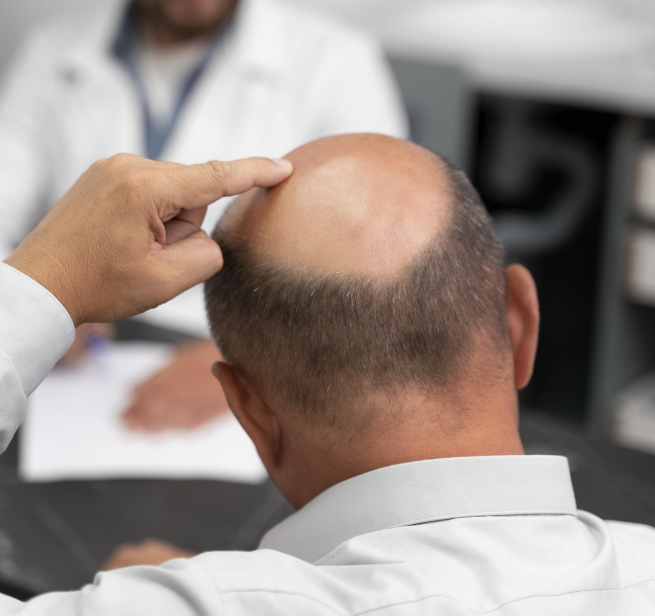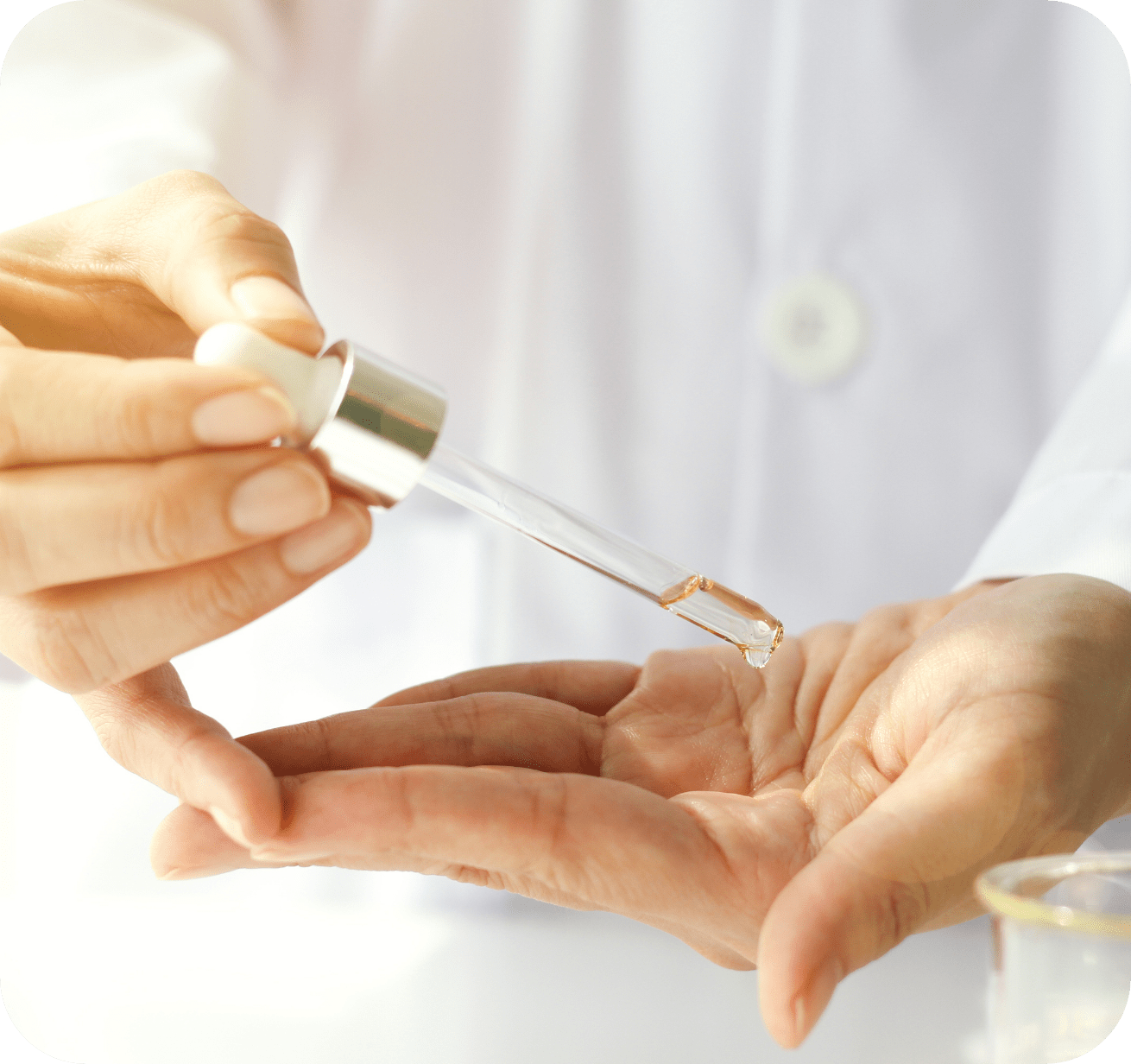Unveiling Emerging Innovations in Hair Science
Welcome to our Scientific Research page, where we delve into groundbreaking studies shaping the future of hair and scalp health. Explore the remarkable potential of natural compounds like Quercetin in activating hair stem cells and protecting against oxidative stress. Discover how the scalp microbiome and inflammation are emerging as key players in understanding and addressing hair loss. Join us on a journey of scientific exploration that promises new insights and innovative solutions for maintaining vibrant, healthy hair.

Quercetin and Hair loss
"Have you heard of Quercetin? It's a natural compound found in various fruits, vegetables, and herbs, and it's gaining attention for its potential benefits in promoting healthy hair. Recent studies have highlighted its remarkable abilities in the realm of hair health. For instance, research has shown that Quercetin can activate hair stem cells, which are essential for initiating new hair growth and maintaining the health of existing hair follicles. These stem cells, residing within the hair follicles, play a crucial role in the regeneration of hair strands during each hair growth cycle. Quercetin's activation of these stem cells can lead to increased hair follicle activity, promoting the growth of new hair and contributing to overall hair density.
Moreover, Quercetin exhibits antioxidant properties that extend to the very roots of our hair, targeting oxidative stress and protecting hair stem cells crucial for hair growth and maintenance. Additionally, Quercetin has been found to promote the formation of new blood vessels in the scalp, a process known as angiogenesis. This is vital for ensuring that hair follicles receive an adequate supply of nutrients and oxygen, creating an optimal environment for healthy hair growth. The angiogenesis action of Quercetin is linked to the activation of hypoxia-inducible factor-alpha (HIF-alpha), a protein that regulates cellular responses to low oxygen levels.
Furthermore, research has explored Quercetin's anti-inflammatory effects, which are crucial as inflammation can disrupt hair growth cycles and contribute to hair loss conditions. Quercetin's anti-inflammatory properties may help reduce inflammation in the scalp, creating a more conducive environment for healthy hair growth.
While more research is needed to fully understand Quercetin's impact on hair health, these studies highlight its promising potential as a natural solution for addressing hair loss concerns.

Scalp Microbiome
Hair loss, a common concern for many, might have a surprising link to the trillions of microbes living on our scalp and gut. Imbalances in these microbiomes, or dysbiosis, are emerging as a potential culprit in various hair loss conditions. Researchers suspect scalp microbes might interact with the immune system and hair follicle health, potentially influencing growth and contributing to inflammation.
Researchers compared scalp and gut bacteria in people with and without androgenetic alopecia (hair loss). They found the scalp bacteria in hair loss patients was more diverse, but gut bacteria weren’t different. Interestingly, the networks of bacteria in both scalp and gut were more complex in those with hair loss, suggesting a link.
Another study focused on the bacteria in hair follicles of people with androgenetic alopecia (hair loss). They found an increase in Propionibacterium acnes bacteria in the miniaturized hair follicles of patients, compared to healthy follicles or those in people without hair loss. This suggests a possible link between this bacteria and hair loss, potentially due to an increased immune response.
Researchers also looked at scalp bacteria, fungi, and oil (sebum) in Japanese men with and without androgenetic alopecia (hair loss). They found that men with hair loss had more scalp oil and a type of fungus that thrives on that oil. Additionally, the balance of bacteria on their scalps was disrupted, potentially contributing to hair loss.

Inflammation and Hair loss
The world of hair loss research is evolving, challenging long-held beliefs about its causes. Researchers now believe that hair loss is a multi-faceted problem, with many causes. While DHT might have a role, researchers now think factors like oxidative stress, inflammation, and specific signalling pathways could also contribute significantly to male pattern hair loss.
In another study, scientists explore how oxidative stress and inflammation could be linked and drive Alopecia Areata, an autoimmune condition causing hair loss. They found higher levels of markers for both oxidative stress and inflammation in people with Alopecia Areata, suggesting a possible cycle where these factors worsen hair loss.
Another study conducted by researchers delves into cellular changes in scalp biopsies of people with common hair loss. They observed increased inflammatory cells around hair follicles (perifollicular inflammation) and loosening/swelling of tissue within follicles (follicular spongiosis). While these changes may be linked to common hair loss, further research is needed to clarify their role - whether they cause hair loss or are a consequence of it (3).
These studies paint a complex picture of hair loss, suggesting multiple factors like oxidative stress, inflammation, and cellular changes may contribute, challenging the simplistic view of hair loss causes.

Oxidative stress and Hair loss
Oxidative stress occurs when there's an imbalance between free radicals and antioxidants in the body, leading to cell damage. A study focused on the hair follicles of individuals with androgenetic alopecia, comparing them to healthy follicles and those without hair loss. Researchers discovered higher levels of oxidative stress markers in miniaturized hair follicles, indicating a potential association between oxidative stress and hair loss. This suggests that oxidative stress could be damaging hair follicles and contributing to their miniaturization, a hallmark of androgenetic alopecia.
Additionally, a study investigating early-onset androgenetic alopecia in young men found a significant association between oxidative stress and hair loss severity. Men experiencing early-onset hair loss showed higher levels of total oxidants and an elevated oxidative stress index compared to those without hair loss. Interestingly, antioxidant levels didn't differ significantly between the groups, emphasizing the role of oxidative stress specifically in early-onset hair loss.
These findings collectively suggest that oxidative stress may play a crucial role in hair loss, especially in conditions like androgenetic alopecia. While more research is needed to fully understand the cause-and-effect relationship and develop targeted interventions, exploring oxidative stress opens new avenues for addressing hair loss concerns, particularly in younger individuals experiencing early onset.




